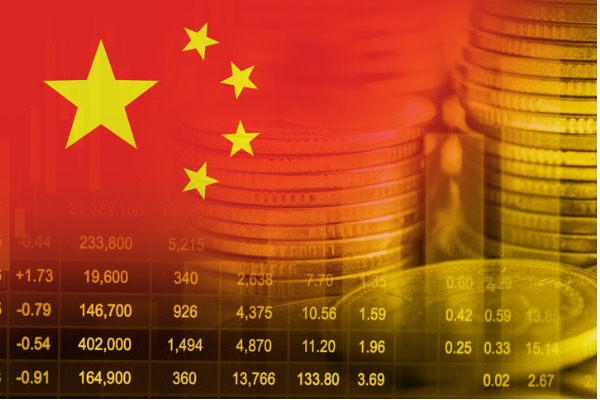This market is the most obvious contrarian bet right now
Valuations for this stock market are at a 55% discount to global shares. This has piqued the interest of bargain seekers, writes Sam Benstead.
17th January 2024 09:33
by Sam Benstead from interactive investor

Going against the crowd is a high-risk, but potentially high-reward approach to investing. One major market stands out today as particularly hated by investors: China.
Over the past 12 months, the MSCI China index, which owns more than 750 Chinese shares, including those listed in Hong Kong and on the mainland, has dropped 47%. It has fallen 228% over the past 12 months.
- Our Services: SIPP Account | Stocks & Shares ISA | See all Investment Accounts
The sharp decline in valuations means that, as of the end of 2023, the price-to-earnings (p/e) ratio of the index is just 11.7x, which is lower than the 14.5x of the MSCI Emerging Markets index and the 19.8x of the MSCI All Country World.
The MSCI World index, which does not include Chinese shares, is on a p/e of 20.7x, meaning that Chinese shares are at a 56% discount to global shares. UBS puts this discount at one of its widest in nearly two decades, with the 2012 to 2016 period also standing out.
- Interest rate fund and trust losers stage a recovery – but will it last?
- Scottish Mortgage repurchases tech giant after value almost trebles in 2023
Fund group Federated Hermes reckons China now trades at a record low valuation relative to the rest of the world.
In fact, cheaper valuations mean UBS forecasts a greater five-year return for Chinese shares than global shares.
Its five-year market expectations point to prospective returns of 8.2% a year for Chinese equities, well above its 6.3% estimate for global equities or 4.2% forecast for US large-cap stocks.
But is this too good to be true? We look at the investment case for China.
Have we reached peak China pessimism?
Fund manager abrdn says that the malaise for Chinese shares has been driven by a wide range of factors, from deflation, pressures in the real estate sector and falling exports, to consumers’ unwillingness to spend, high youth unemployment and geopolitical tensions. But this could mean “peak pessimism” towards the giant emerging market, it argues.
Abrdn says that fears about “Japanification” and its lost decades of stock market growth are overblown.
“Similar to its island neighbour, China potentially has a large property bubble, is ageing rapidly and is feeling the pressure from geopolitical tensions with the West.
“There are, however, reasons to think that these so-called Japanification risks are overstated, both in terms of their strength and in their timing,” abrdn said.
- Why 2023’s biggest stock market story has staying power
- The best and worst-performing investment trusts of 2023
The fund group says that China’s shrinking population does not signal an impending collapse in underlying demand as urbanisation still has room to run.
“Japan was an advanced economy when its own asset bubble burst in the late 1980s. By contrast, China’s GDP per capita still implies substantial growth potential, even if it is being challenged by US actions aimed at limiting the country’s access to high-end technology,” abrdn adds.
Another optimist is Jonathan Pines, head of Asia ex-Japan at Federated Hermes, who says a lot of the bad news about China is in the price already.
“Given the extreme absolute and relative valuations on offer, we are betting on both South Korea’s and China’s stock markets to outperform. When stocks are this cheap, it only takes news to be less bad than feared for stocks to rise. In China, the impetus might be provided with a softening of tensions with the US and continuing stimulatory policy support (followed by fear of missing out by underweight fund managers),” Pines said.

The bull case for China
Another cause for optimism, according to abrdn, is that looser monetary policy in China is beginning to drive economic growth and increase investor confidence.
The researchers add that further interest rate policy easing is expected and this should reduce the risk of a recession.
“A ‘big bang’ approach still seems unlikely but, like the difficulty of judging the combined effects of pulling so many policy levers, multiple small steps could still add up,” abrdn said.
Also optimistic is Raheel Altaf, manager of the Artemis SmartGARP Global Emerging Markets fund, which has 32.4% invested in China. He says that in China, although growth is low, so is inflation.
“That leaves room for stimulus measures from central banks without sending prices spiralling. While you shouldn’t expect the Chinese government to start implementing enormous economic stimulus packages, it does appear to be applying some measures – such as a recent cut in 12-month lending rates.
“We expect more steps like this. With investor expectations so bleak today, even a modest recovery in demand from domestic consumers could lead to a significant uplift in some share prices of Chinese companies,” he said.
Another positive, according to Altaf, is that China is a lot less dependent on the US economy today, so a recession in the US would not derail China’s economic recovery. He says that through its Belt and Road infrastructure project, it has strengthened relations across Asia, Africa and Latin America.
“It now exports far more to Asia than to the US. And Asia has been thriving, even without the benefit of a Chinese economy on fire,” he said.
- Fidelity China Special Situations to benefit from merger with rival
- Ian Cowie: India vs China, there’s no contest for my money
The shape of the Chinese economy has changed, Altaf adds, and this year it has overtaken Japan as the world’s largest car manufacturer.
“In the first seven months of this year, 189,000 Chinese cars were sold in Europe. UBS estimates that by 2030, one in five cars sold in Europe could be Chinese. China is leading the world in the production of batteries, too,” said Altaf.
The Chinese government is also keen to see the stock market recover. It unveiled a new blue-chip index in January, the CSI A50 index, in a bid to attract more investors into key sectors.
The index comprises 50 large companies listed in Beijing, with a focus on industries that the government sees as strategic, such as healthcare and energy. It contrasts with the CSI 300, which comprises far more companies and is more heavily concentrated in finance firms.
What about the risks?
Of course, cheap markets can always become cheaper, and 12 months ago some investors were already banging the drum for China and citing cheap valuations as a reason to invest.
Pacific Assets , a Super-60 rated Asia investment trust, has just 10.7% invested in China, compared with nearly half the portfolio in India.
The managers warn that the economy in China is deteriorating and that geopolitical headwinds are strengthening, which may cause heightened volatility especially as we near the election in the US in 2024, which is likely to sharpen US rhetoric and actions against China.
They also dislike political involvement in the private sector in China, which makes investing in the country very unpredictable. This view is shared by the investment world more generally, with the Financial Times reporting that foreign investors pulled around $29 billion (£23 billion) out of Chinese stocks in 2023, causing foreign investment in Chinese shares to drop nearly 90%.
Nevertheless, the Pacific Assets managers stress that such volatility may provide attractive opportunities to invest on the cheap.
“We believe that over the longer term investing in companies with high-quality stewards, franchises and financials is the best way of protecting and growing shareholder capital through economic and political cycles,” they said.
These articles are provided for information purposes only. Occasionally, an opinion about whether to buy or sell a specific investment may be provided by third parties. The content is not intended to be a personal recommendation to buy or sell any financial instrument or product, or to adopt any investment strategy as it is not provided based on an assessment of your investing knowledge and experience, your financial situation or your investment objectives. The value of your investments, and the income derived from them, may go down as well as up. You may not get back all the money that you invest. The investments referred to in this article may not be suitable for all investors, and if in doubt, an investor should seek advice from a qualified investment adviser.
Full performance can be found on the company or index summary page on the interactive investor website. Simply click on the company's or index name highlighted in the article.